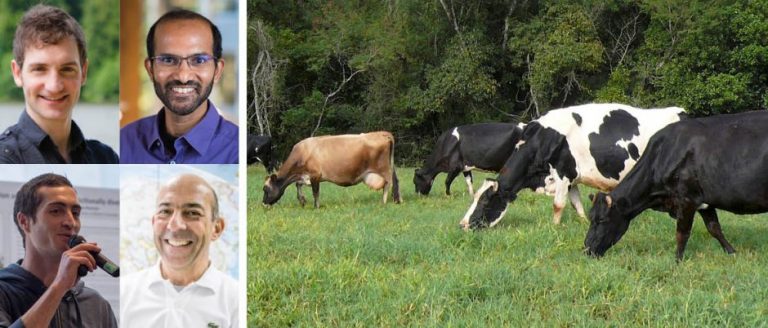March 2: “Grazed and Confused”: Panel on meat production, climate change, and sustainability
Friday, March 2, 2018, 10:00 a.m. – 11:30 a.m. Room 107 – Aquatic Ecosystems Research Laboratory, 2202 Main Mall
Grazing animals have a significant influence on anthropogenic greenhouse emissions from agriculture. This seminar will invite dialogue on topics related to meat production, grazing, environment and climate Change. For a background document, see the Food and Climate Research Network’s recent report on grazing systems and climate change.

Hosted by: UBC Animal Welfare Program; Centre for Sustainable Food Systems; Institute for Resources, Environment, and Sustainability
Format: three 10-15 minute presentations followed by open discussion.
Panel Schedule:
- Introductions and welcome
- Beyond GhGs: assessing the water footprint of cattle in Southern Amazonia – Michael Lathuillière, IRES PhD Candidate
- Michael Lathuillière is a Ph.D candidate at UBC’s Institute for Resources, Environment and Sustainability (IRES) and has specialized in Water Footprint assessment methods applied to agricultural products. His research focuses on how Water Footprint assessments may guide decision-making in Brazil where soybean and beef production have increased rapidly in recent decades in both Amazon and Cerrado biomes.
- Is reduced consumption of livestock products a strong leverage point to achieving the Sustainable Development Goals? – Navin Ramankutty and Zia Mehrabi
- Navin Ramankutty is Professor and Canada Research Chair in Global Environmental Change and Food Security at the Liu Institute for Global Issues and the Institute for Resources, Environment, and Sustainability at the University of British Columbia. His research program aims to understand how humans use and modify the Earth’s land surface for agriculture and its implications for the global environment.
- Zia Mehrabi is a Postdoctoral Research Fellow at IRES, the Liu institute for Global Studies & the Centre for Sustainable Food Systems. He has worked in industry on large scale farmland expansion in sub-Saharan Africa, in a non-profit setting on developing environmentally conscious decision support tools for land managers, and with small scale farmers on the interactive effects of agricultural intensification and climate change on crop yields.
- Grazing cattle in family farming: welfare for the cow, the farmer and the consumer? – Luiz Carlos Pinheiro Machado
- Luiz Carlos Pinheiro Machado is a visiting professor at UBC Animal Welfare Program. He is as full professor at the Federal University of Santa Catarina, Brazil, where he leads a research group on Animal Agroecology and Animal Welfare, focusing on the behavior and welfare of dairy grazing cows and pasture management. He will present on how the balance (Carbon stocked vs. Carbon release) rather than emissions alone should be considered when evaluating grazing systems. He will relate this to the welfare of animals, quality of life for the farmers and quality of food for the public.
- Open discussion and questions
The UBC Future of Food Global Dialogue Series events are free and open to all. This campus-wide initiative brings together food security and sustainability experts from across the globe to engage the UBC community and the public around the Global Food System.